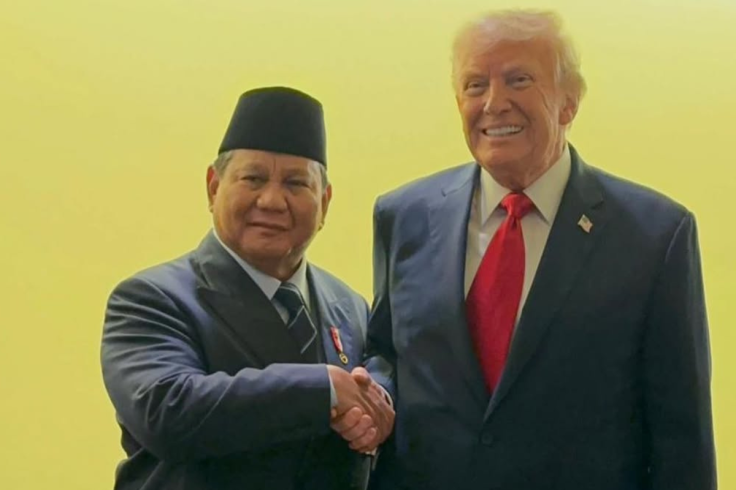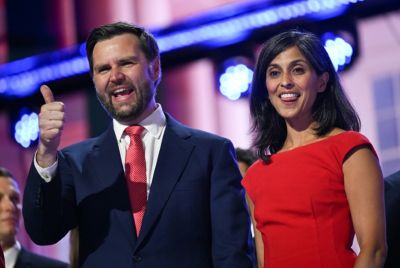Why Did the Indonesian President Want to Meet Donald Trump's Son, Eric? Here's What the Two Leaders Whispered About After a Gaza Summit
Prabowo's request raised questions about business and diplomacy

Tensions gave way into whispers on 13 October 2025, as Indonesian President Prabowo Subianto seized a fleeting moment at Egypt's Gaza peace summit to make an unexpected request: a meeting with Eric Trump, son of US President Donald Trump and executive at Trump Organization.
Unaware of the live mic, Prabowo and Trump spoke freely during the ceasefire celebrations. Their exchange, later circulated widely, appeared to blend diplomatic pleasantries with potential business opportunities.
For many Indonesians hopeful for economic revival, the encounter drew attention to how personal ties could unlock potential investment opportunities, while prompting questions about the blurred lines between official engagements and commercial ambitions.
The Hot Mic Moment: Whispers at the Gaza Summit
World leaders gathered at Sharm el-Sheikh on 13 October 2025 for the Gaza-focused summit, where Trump hailed a 'new era of peace' following the Israel-Hamas ceasefire announcement. As applause faded, Prabowo lingered behind the podium with Trump, oblivious to the live microphone broadcasting their aside.
The Indonesian leader first alluded to a troubled area, stating it was 'not safe, security-wise', before pivoting to his plea: 'Can I meet Eric?' Trump, ever the doting father, replied warmly: 'I'll have Eric call. Should I do that? He's such a good boy. I'll have Eric call.' Prabowo pressed on, suggesting 'We'll look for a better place' and broadening the ask to 'Eric or Don Jr', referencing the brothers who helm the Trump Organization.
This unguarded chat, replayed across global feeds, transformed a diplomatic afterglow into a viral sensation. Observers were left to wonder if Gaza's truce masked murmurs of commerce. For families in Indonesia, where economic partnerships promise jobs, such whispers evoke hope laced with caution over foreign influences.
Business Ties: Trump Organization's Expanding Reach in Indonesia
The Trump Organization's ventures in Indonesia provide the backdrop to Prabowo's overture, with Eric Trump overseeing expansions that blend opulence and opportunity. In March 2025, the firm unveiled its first Jakarta golf club, a sprawling 18-hole course developed alongside local tycoon Hary Tanoesoedibjo's MNC Land, drawing affluent golfers and boosting tourism.
Further afield, a luxury resort and golf club in Bali's Tabanan district remains listed as 'coming soon' on the company's site, promising eco-luxury stays amid rice terraces. These projects, valued at hundreds of millions, align with Prabowo's vision for infrastructure-led growth since his October 2024 inauguration, fostering ties that could secure investments amid Indonesia's £1 trillion ($1.4 trillion) economy.
Eric Trump's role as executive vice president positions him as the key liaison for such deals, where family networks often seal pacts. Reuters noted on X: 'Indonesian President Prabowo Subianto asked President Trump if he could meet with Trump's son Eric... at the Gaza-focused summit in Egypt' .
Indonesian President Prabowo Subianto asked President Trump if he could meet with Trump's son Eric, an executive vice president of the Trump Organization, according to comments by the leaders picked up by a microphone at the Gaza-focused summit in Egypt https://t.co/5MZmWnE7v0
— Reuters (@Reuters) October 14, 2025
For ordinary Balinese communities, these developments mean potential livelihoods, yet the hot mic moment fuels debates on whether elite handshakes truly trickle down benefits.
Broader Implications: Diplomacy, Deals and Ethical Shadows
Prabowo's sideline chat underscores the delicate dance between statecraft and commerce, as Trump handed business reins to sons Eric and Don Jr upon his January 2025 return to the White House.
Ethics watchdogs have long decried this setup, echoing first-term critiques that it invites conflicts of interests. The Trump Organization's global portfolio—spanning hotels to blockchain—could potentially sway policy. In Indonesia, where Prabowo champions US partnerships, including a July 2025 agreement to reduce tariffs and ease non-tariff barriers across key sectors, such meetings could accelerate bilateral flows worth billions.
Yet, Prabowo's offhand remark that an area was 'not safe, security-wise', hints at deeper geopolitical undercurrents, where security cooperation and economic incentives appear to overlap in Southeast Asia's shifting power dynamics.
© Copyright IBTimes 2025. All rights reserved.





















